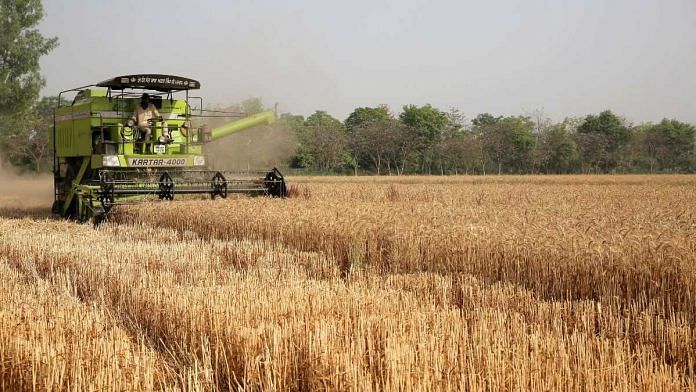Thank you dear subscribers, we are overwhelmed with your response.
Your Turn is a unique section from ThePrint featuring points of view from its subscribers. If you are a subscriber, have a point of view, please send it to us. If not, do subscribe here: https://theprint.in/subscribe/
Most of the time, farmers work in a buyer’s market. Their large harvesting and marketing of crops—with the possible exception of milk—causes abrupt increases in supply relative to demand, which drives down prices. Farmers are price takers rather than price makers as a result of these market conditions, which favor buyers over sellers. They sell at prevailing supply-and-demand-determined rates because they lack the market ability to set the MRP or even influence the prices of their products, as do businesses in most other industries. Even worse, even though their crops are sold at a discount, they still have to pay full price for anything from tractors, cement, toothpaste, soap, and medications to seeds, pesticides, diesel, and seeds. Not without reason, farmers occasionally need minimum support prices for their crops
There may be a push for parties to add “legal guarantee for MSP” in their manifestos as the Lok Sabha elections get near.However, the majority of economists oppose government-fixed MSPs that use cost-plus pricing. Most of them think that supporting farmers with
“income” rather than “price” is preferable. That would include paying a set amount of money into their bank accounts each year, either on a per farmer basis or otherwise.
However, how is MSP guaranteed? There are two accepted methods. First, purchasers should be made to pay MSP. Legally, sugar mills must reimburse can producers within 14 days of acquisition with a “fair and remunerative” or “state advised” price.
However, there is a chance that this strategy won’t work as planned. Repeated cane payment arrears are evidence, or worse, the private trade may decide not to buy any at all.
The second option is for all of the farmers’ marketable produce to be purchased by government organizations under MSP. That is not financially or physically feasible.
However, Price Deficiency Payments (PDP) is the third choice. It means that if the market price is lower than the MSP, the government will just pay farmers the difference, without physically buying or stockpiling any crops. The amount of harvest they sell to the private market will determine how much they are paid.
The Bhavantar Bhugtan Yojana in Madhya Pradesh was the first place where PDP was implemented. The market price for crops under this program was equal to the average modal (most-quoted) rate for the crop in the APMC mandis of M.P. and two other growing states during the month of sale. The price differential between the actual quantity sold by the farmer and the MSP was payable.
The Haryana government proposed an additional model called the Bhavantar Bharpai Yojana, is being implemented mainly in bajra.
Both Madhya Pradesh and Haryana have demonstrated the feasibility of delivering MSP to farmers at least in some crops other than rice, wheat and sugarcane.
The APMC mandi infrastructures and farmer registration systems that have already been established in these states have contributed to their ability to accomplish this.
This enables the recording of every transaction, including the amount of a crop sold by a farmer at a certain price, and the payment of the difference between that amount and the MSP.
The implementation of a national PDP program with 50% Central funding would encourage other states to emulate the M.P. and Haryana model.
To begin with, they could construct the market infrastructure and system that would eventually allow even their farmers to get MSP, whether through legal means or not.
These pieces are being published as they have been received – they have not been edited/fact-checked by ThePrint.

